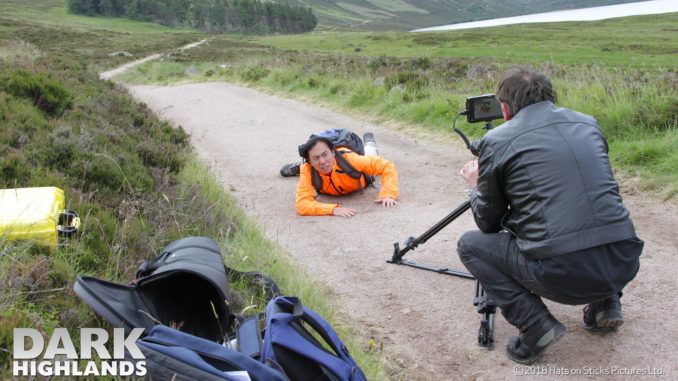
Having previously complained about films set in Scotland that aren’t filmed there, it’s nice to see one which actually is. To that end we recently watched wilderness horror, Dark Highlands. However, it turned out that, more than a decade ago. I had reviewed director Mark Stirton’s remarkably ambitious debut feature, The Planet, which turned a beach in the North-East of Scotland into an alien world on a budget of considerably less than ten thousand quid. It was therefore probably rather easier for Stirton and his team to film in the Highlands, since they were practically there to begin with.
Still, the concept of an Aberdonian film industry, however minute it may be, is intriguing. For despite being Scotland’s fourth biggest city, I’m hard pushed to think of many films made or even set there. And I subsequently ended up going down a bit of a Stinton rabbit-hole. Turns out we crossed paths, at least geographically, in Aberdeen during the mid-eighties. I was at university, avoiding the local football hooligans (the much-feared Aberdeen Casuals), and he was getting his cinematic career under way, with Doctor Who fan films and other similar stuff.
Stirton’s experiences in those days are covered in Movie Boy, a fast and loose – to put it mildly – book about his experiences in both film-making and the business. with a brief foray into poorly-executed armed robbery. Though it stops just before Dark Highlands got under way, it’s well worth the £2.04 the e-book cost me on Amazon. I also watched One Day Removals, his second feature, which never received the commercial release it richly deserved – as you’ll see below, it perhaps should have been Britain’s entry in the Oscars for Best Foreign Language Film – so he put it up on YouTube instead. And while COVID-19 wreaks havoc on film-makers everywhere, he made a digital animated short, Wrong Time, Wrong Space.
I ended up corresponding with the man himself, to discuss his career, the perils of filming in the Highlands and the life in Aberdeen.
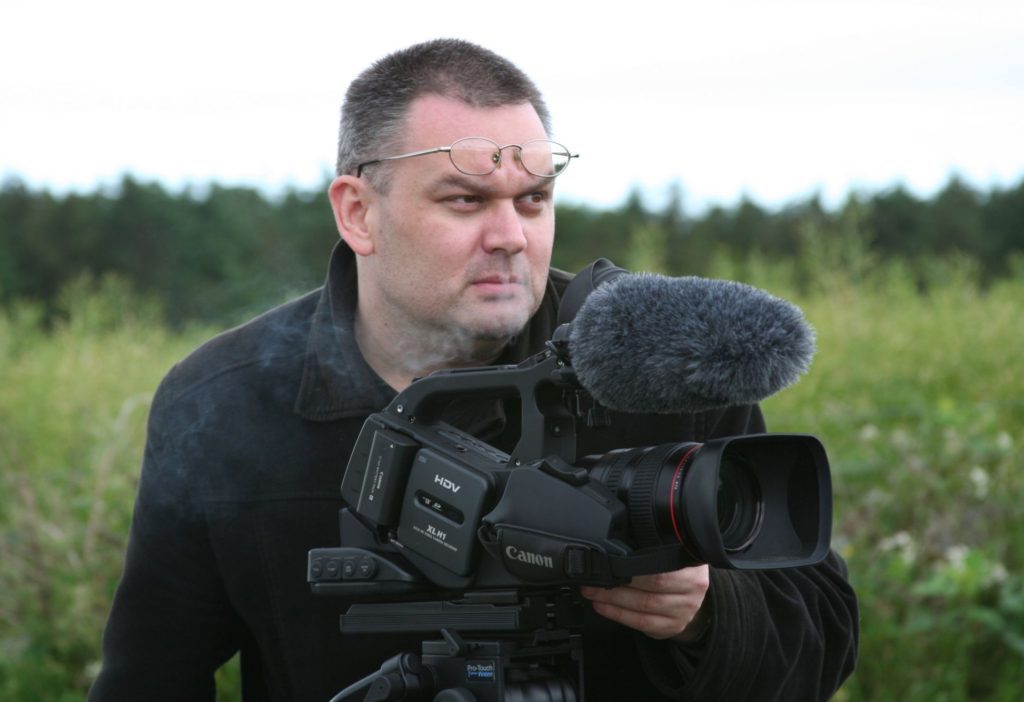
How’ve you been coping with lockdown?
Fine, I’m naturally reclusive anyway.
You said in ‘Movie Boy’, “All short films suck.” Do you still feel that way, now you’re back making one?
Well Wrong Time, Wrong Space was rejected for every film festival and animation competition it was entered for, so I guess I made one of the short films that sucked. Sorry. [But, wait! Mark spoke too soon. Since the interview took place, it was selected for the Beyond the Curve International Film Festival, winning awards in the Animated and Science-Fiction categories]
Outside of the music, WTWS looks like a one-man production. Was it by choice, given that reclusive nature, or just a result of COViD-19?
Just COVID. I was planning a full cast production, but that got well humped. I did approach numerous CG artists for help, but no cunt was interested.
How long did WTWS take to make, and what elements proved harder or easier than expected?
7 months. It was pretty easy really. I only storyboard what I know I can do.
While you’ve obviously got plenty of digital FX experience, going back to The Planet, was it difficult to go fully narrative for WTWS and tell a story with them?
Not really. If anything it was considerably easier than traditional film-making. No location weather to deal with, no crew to deal with, no actor egos to worry about, plus, I was always near tea, which was nice.
Jon Brooks’s music on it is great. How did you find him, and was it scored to your edit, or did you edit to the score?
We worked together from shot one, very much a creative partnership. I’d animate, send the shots down and he’d create the music to go with it. Jon also did the score for Dark Highlands. He’s a real pro.
If you could go back in time to the first day of shooting The Planet, what would you tell yourself?
Chill.
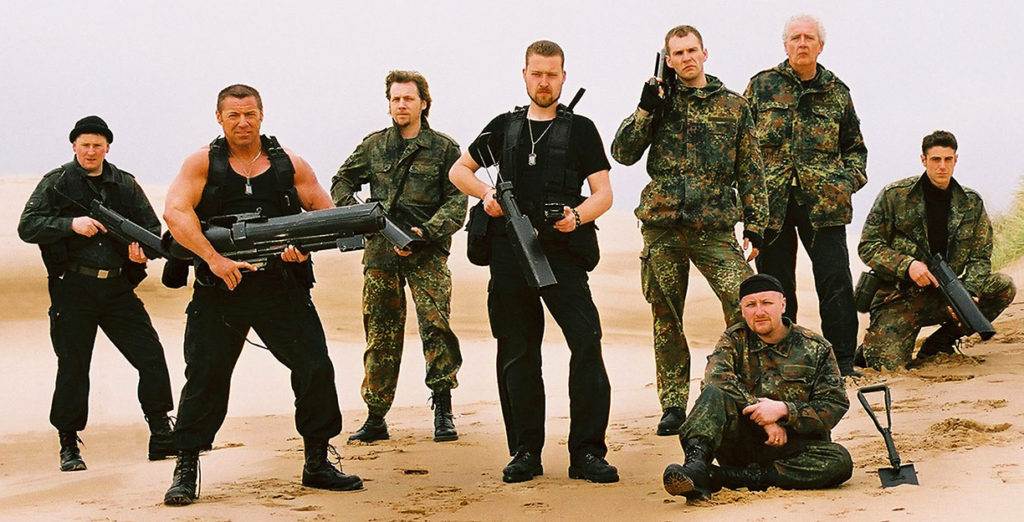
Looking at your three feature films, they could hardly be more different. How deliberate was it that your next movie, One Day Removals, was a very down-to-earth black comedy. about two guys in a van, told entirely in Doric?
I just don’t like doing the same film twice. If you look at Kubrick he could go from historical drama to black comedy to straight horror, so I guess that was my guide. Having said that, those were just the films I could get off the ground, plenty fell by the wayside, so it could easily have gone, horror, drama, horror if it had worked out differently, At the end of the day I made the films I could afford.
Sadly – because it’s great fun – One Day Removals never got proper distribution. Does that bother you, or does the process of creation matter more to you?
To be honest the minute I wrote the script in broad Doric I knew we’d be in trouble distribution wise. In that one instance I was happy just to make a local film for local people. Kinda worked as well since 12 years later I still get reminded about One Day Removals on a near daily basis in the North East – but only in the North East.
“Boy, do I have stories to tell about this one,” you said in regard to Dark Highlands. Until Movie Boy Vol.2 shows up, tell us some stories…
I’m not ready to remember that one yet, suffice to say it’ll be a cold day in Hell before I write the words; EXT: Highlands, ever again! Can you hear a midge? I think I can hear a midge…
Again, the lack of dialogue is a sharp contrast to One Day Removals. Was this always part of the project, or did that element show up as it evolved?
It was always there. I think in One Day Removals my directing was hardly the most important aspect of the film, the significant thing I did on that film was write the screenplay. So, I wanted a project that was very director heavy and one way to do that was make it dialogue free and just make it about the directing.
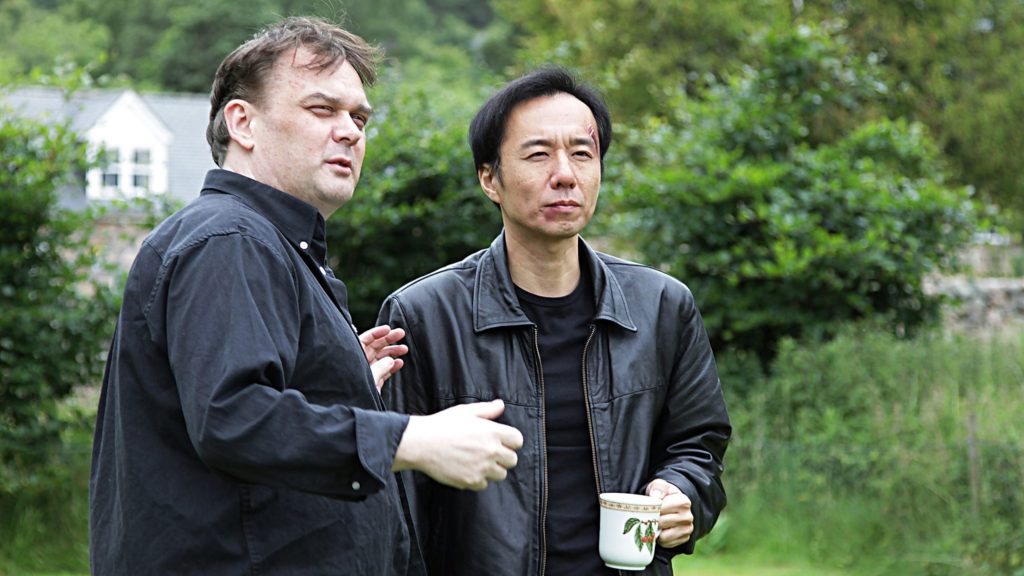
Another unusual element is a Japanese lead. How did that come about?
I just wanted someone who’d look naturally out of place in the Highlands. If it was a Scottish guy, you’d probably get frustrated that a Scotsman or woman would be so hapless in the Highlands, but someone who’d never been there, someone who was clearly not of the Highlands was important. And Junichi was perfect, he really was totally out of his depths up there.
Producer Michael Clark said, “It was made by 2 people and a cat.” What were the biggest pros and cons of the small crew?
The trouble with location filming in the Highlands was you had to take everything with you, everything. So the smaller the crew, the less food you have to bring, less people to keep an eye on, less people to break a leg. Now the disadvantage in that you don’t have a very deep bench. If someone drops out, you suddenly have a much larger hole with a 10 person crew than a 100 person crew. Plus you don’t get noticed as much so you can sneak in and sneak out without needing too many permissions, which we never have anyway.
The aerial photography in Dark Highlands is particularly striking. How did that come about?
Bought a drone, gave it to a photographer and let him have a go. With the Highland wind it was impossible to storyboard exactly what I wanted, the bastard thing would just float off most of the time. So, we’d send it up and get what we got. God was in charge those days, not me. Eventually Mark Wyness (a pro photographer) just went out by himself and got all the opening shots we needed, thank goodness.
You were particularly harsh about Creative Scotland in ‘Movie Boy’. How would you fix the current Scottish/British film-making system?
It’s not fixable. To be honest I don’t even look in that direction anymore. We’re not on the list, never gonna be on the list, never gonna get that sort of funding, so I don’t even try anymore. People describe themselves as independent filmmakers, but they rarely are. I’m 100% independent, I don’t jump through hoops anymore and my work, for better or worse, is my own.
What have you got planned for after the lockdown is over?
Another film, always another film. Not much can stop me these days, maybe a shotgun?
Are you still based in Aberdeen?
Fuck aye, min.
I’ve hardly been back to Aberdeen since getting married there in 2002. What has changed about it most over the decades?
Me. I’m much older now. As for the city? Not much has changed, does it ever?
Apart from you, I’ve heard of Clear Focus working out of Aberdeen, and that’s about it. Is there much of a film-making community in Aberdeen?
Every year a director will get in touch, interview me, claim they were about to put Aberdeen on the map… then I’d never see them again, nor their film. Talk is cheap, films are hard.
Did you ever think about moving elsewhere, to further a movie career?
Naaah. I’m a local loon. Besides, I’d have to be, you know, offered something.
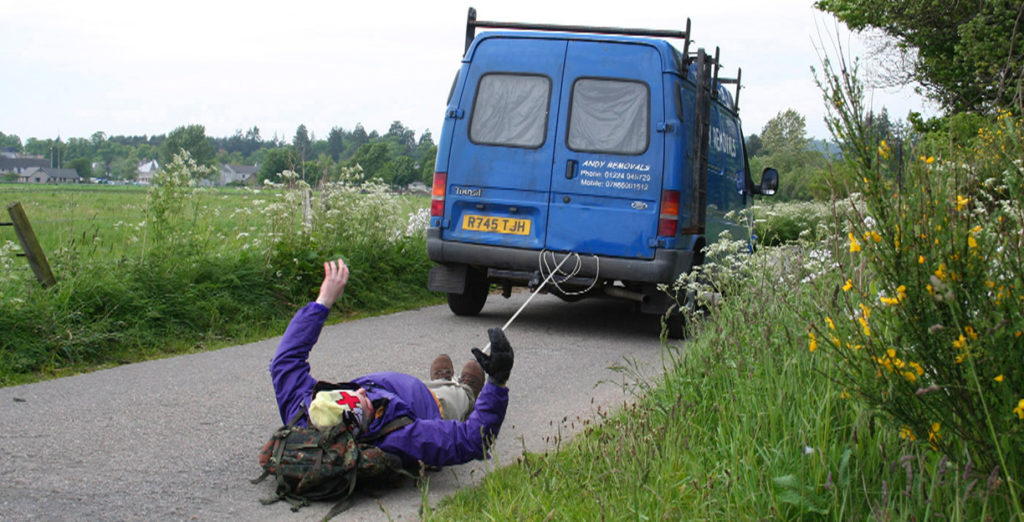
Looking back over your three features, what one scene are you proudest of?
Probably on One Day Removals when Clarkie is dragged by the van. Not a groundbreaking scene or anything, but it had the potential to go wrong and someone could very easily been hurt. But, we used our brains and did it right and no-one even scrapped a knee. The only sequence in the whole movie that was storyboarded. No point in risking extra shots if you don’t need ’em. Most of that is down to Clarkie just being a good and safe stuntman.
And finally, what are the biggest lessons you’ve learned from them?
Probably that you never really know how things are going to be either embraced or ignored. I didn’t predict that One Day Removals would still be as popular locally 12 years later as it was when it was made. I didn’t expect it to go to Raindance and be a festival hit. If I’d been trying for that, it probably wouldn’t have worked as well. I thought Wrong Time, Wrong Space was rather good, but it’s not been received well at all in Scotland. 100% local failure. Also the title of my next book…
[Thanks to Mark, and Michael Clark of Hats On Sticks Pictures, for their time and assistance]
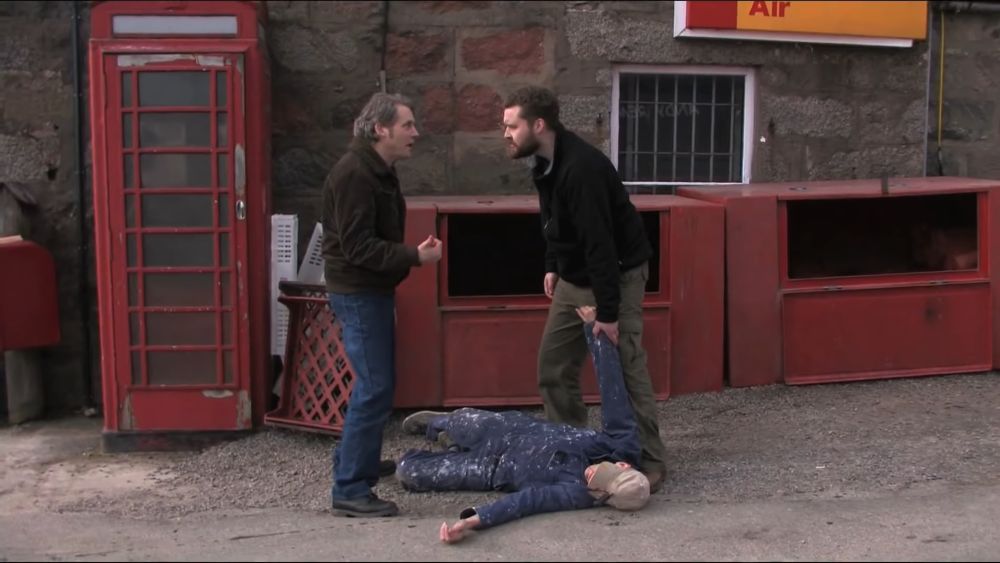
One Day Removals (2008)
Rating: B
Dir: Mark Stirton
Star: Patrick Wight, Scott Ironside, Mike Mitchell
Andy (Wight) and Ronnie (Ironside) are two removal men, out on what’s supposed to be a normal job. Due to an unfortunate and escalating series of events, they end up with an ever-increasing pile of dead bodies in the back of their van. And all their efforts to deal with the problem, whether it’s dropping the corpses off a bridge, or attempting to contact the local mafia, only seem to make the situation go from bad to worse.
This is notable in a couple of ways. It’s the first feature film ever made in Doric, the dialect used in the North-east of Scotland. And it is incredibly foul-mouthed. Seriously. There exists a “sweary edit” which is simply the cursing (and is surprisingly coherent!). According to it, the film includes 440 uses of fuck/fucking, 24 of cunt, 24 of shit/shite and 33 sundry other bad words. The f-bombs would put it in the top five all time, though as it never received commercial distribution, this likely doesn’t qualify. It’s a shame, and is perhaps more due to the first point of note. For it might well qualify as foreign language by Oscar rules and require subtitles to be understood by anyone unfamiliar with Doric. However, Chris was able to grasp it, and she was born in New York, rather than Newmachar. She’s clearly been hanging out with me for too long.
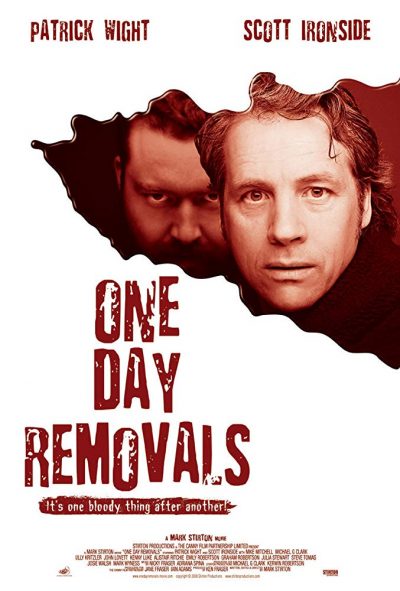 That said, the swearing feels entirely authentic, and once you get settled in, has an almost poetic, rhythmic quality. For an example, check out this scene, which sees our two heroes bickering over their ongoing problems and trying to figure out if any of their accidental victims can be salvaged. For bonus points, enable the YouTube auto-generated captions, and witness their abject failure. For example, a phrase which should be captioned as “Folk tend to notice when four fucking folk all go missing the same day”, somehow ends up subtitled as, “Folks pay the newest windfall fucking bukkake miss Anna seemed ad”. Hey, at least they got a couple of words more or less right…
That said, the swearing feels entirely authentic, and once you get settled in, has an almost poetic, rhythmic quality. For an example, check out this scene, which sees our two heroes bickering over their ongoing problems and trying to figure out if any of their accidental victims can be salvaged. For bonus points, enable the YouTube auto-generated captions, and witness their abject failure. For example, a phrase which should be captioned as “Folk tend to notice when four fucking folk all go missing the same day”, somehow ends up subtitled as, “Folks pay the newest windfall fucking bukkake miss Anna seemed ad”. Hey, at least they got a couple of words more or less right…
The dialogue is certainly the film’s strongest suit. But it’s helped by two central performances perfectly suited to the lines, whether the frequent lament of “We should have worn gloves,” or Andy waxing lyrical in a theological vein: “God? Fuckin’ God? What exactly has God done for us today, Ronnie? If there’s one cunt that hasn’t done fuck all for us today, it’s God.” These are characters for whom it’s very easy to root, just ordinary blokes who are way out of their depth, and you want to see them find a way out of their predicament.
Less successful are the beginning and end. There’s some ropey audio early on which is distracting – especially given the importance of speech to the film overall – and the end of the film goes on too long. We always know they end up arrested, because things are told in flashback by Andy to a disbelieving police officer (Mitchell). Nothing after that happens adds significantly to the story. But overall, it was mostly successful, even if it’s never exactly going to have a broad audience, by its very nature. A film further from its predecessor, The Planet, is hard to imagine, and that difference helps make this impressive. The whole thing was made available by the director on Youtube, so prepare for a genuinely unique experience.
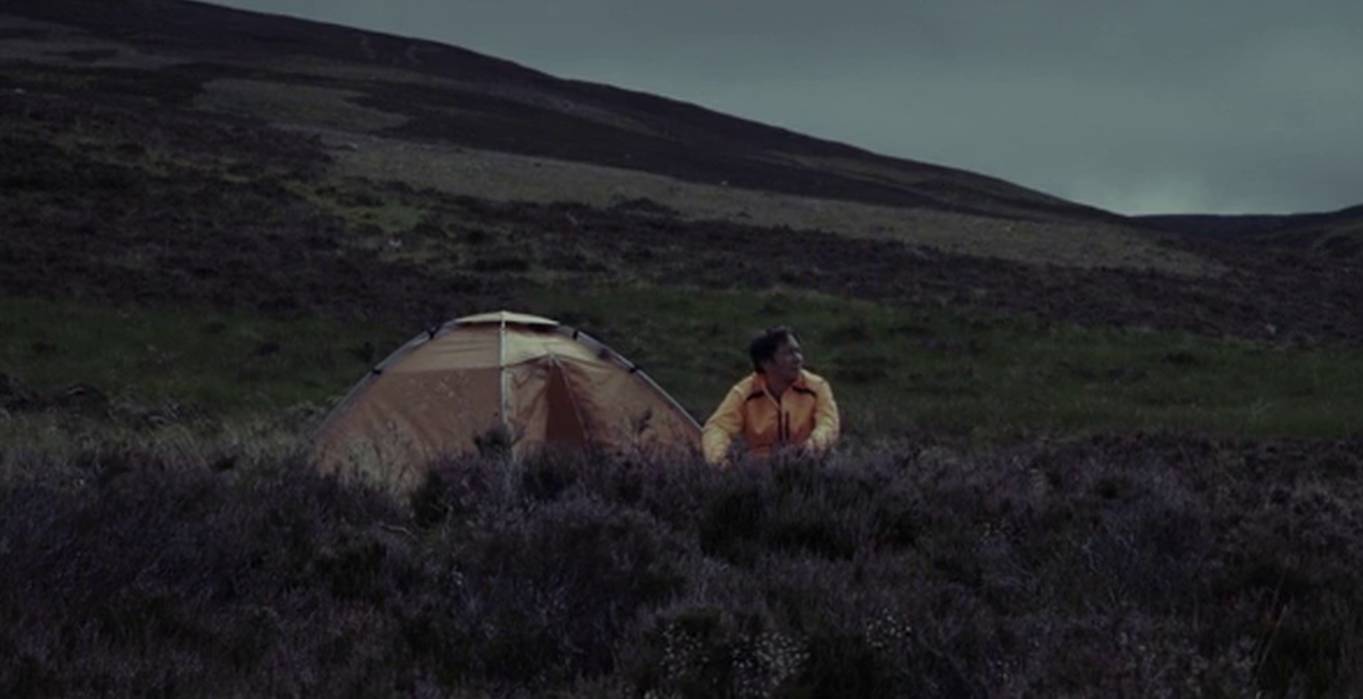
Dark Highlands (2018)
Rating: B-
Dir: Mark Stirton
Star: Junichi Kajioka, Steve Campbell
After an opening narration by Scottish legend Brian Cox, reciting a poem about “Highland death” we see a man (Campbell) try to commit suicide, in a tent somewhere in the Scottish countryside. He survives, but apparently the experience unhinges him, turning the man into a gamekeeper-like. masked serial killer. Ten years later, a Japanese artist (Kajioka) visits the area, on a painting tour. He becomes the next target for the killer, harassed relentlessly across the remote mountainous landscape.
Stirton’s third film is another sharp change in direction. This is less effects-heavy than his feature debut, The Planet: this time, he only needs to make the Highlands look like the Highlands, not another world. Though I suspect special effects were still likely required, to create the impression it was sunny – frankly, the most implausible thing here. Either that, or they filmed all through the Scottish summer: both days of it. Hohoho. But what’s most striking here, is the dialogue. This is often an issue with low-budget films, both technically and from an artistic perspective. It’s dealt with here… by getting rid of it almost entirely, in sharp contrast to its very chatty predecessor, One Day Removals. A somewhat brave move too, because a film-maker must then rely on other ways to tell the story. For the most part, Stirton does so effectively, although I’m not certain the story is there, however.
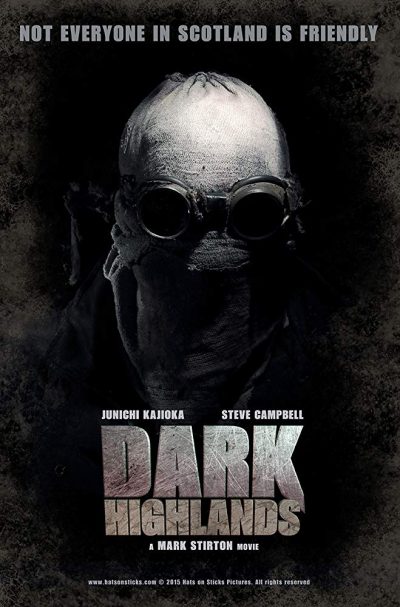
For this is definitely not a film to watch if you like explanations. There’s a lot here which is left, I suspect deliberately, entirely obscure. Not least the motives for the killer’s actions: he could off his victim at any point, and has no hesitation in doing so to anyone else who gets in his way. Yet, instead, he repeatedly uses tranquilizer darts, and on one especially bemusing occasion, even pitches the artist’s tent for him, so he has shelter when he wakes up. Perhaps it’s going for a Hitcher-like sense of “I want you to stop me”. But instead, it comes off more as under-written, not least because he’s never any more than a cypher, and certainly not Rutger Hauer. [Than again: who is?]
However, according to the film’s Facebook page, the gamekeeper hunts because, and I quote, “He’s a fuckin’ mental cannibal!” Yes, he’s a fuckin’ mental cannibal…who has acquired and learned to use a drone with a high degree of proficiency? Still, there appears to be a certain auteur-esque quality to this approach. In Stirton’s book Movie Boy, he talks about faffing around with a bunch of friends and a camcorder in the late eighties, and says, “If my style of direction is influenced by anything, it’s the egregious incomprehensibility of those early films.” In the light of this, Dark Highlands makes a lot more sense. Or, at least: its lack of sense, makes sense, even if I was still confused by its use of the word “iteration” to describe each of the three sections.
How much this all bothers you will likely impact your enjoyment of the film. It annoyed Chris considerably more, so she reached the end and… had questions. So. Many. Questions. Me, I’m rather more relaxed: I’m less bothered about the final destination, providing the journey to get to it is an interesting one. That’s the case here, and there were a number of elements which had me thinking “Oh, cool,” such as the perpetual buzzing of insects which accompanied the gamekeeper. Lord of the Flies, perhaps? Or just a nod to the horrors of the blood-sucking Highland midgie? At the very least, you’ll get to enjoy some well-photographed and spectacular scenery.
